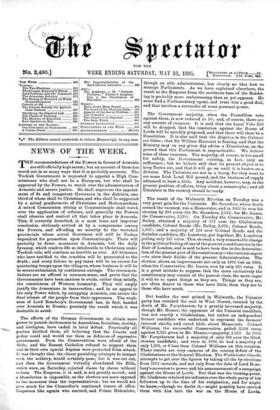But besides the seat gained in Walworth, the Unionist party
has retained the seat in West Dorset, vacated by the death of Mr. Farquharson, by a greatly increased majority, though Mr. Homer, the opponent of the Unionist candidate, was not exactly a Gladstonian, but rather an independent farmer candidate who undertook to represent the farmers' interest chiefly, and cared little about Home-rule. Colonel Williams, the successful Conservative, polled 3,538 votes, against 2,325 given to Mr. Homer,—majority, 1,213. In 1892, Mr. Farquharson had a majority of only 886 over the Glad- stonian candidate; and even in 1886, he had a majority of only 1,205, or 8 less than Colonel Williams on this occasion. These results are very ominous of the coming defeat of the Gladstonians at the General Election. The Westminster Gazette attempts to get over the figures by taking all the by-elections from 1892 onwards, and not only from the date of Lord Rose- bery's accession to power and his announcement of a campaign against the House of.Lords. But that was the turning-point. Mr. Gladstone retained his influence over the whole party of his followers up to the time of his resignation, and for aught we know,—thongb we doubt it,—might possibly have carried them with him into the war on the House of Lords.
But undoubtedly Lord Rosebery failed completely to inspire the constituencies with confidence, and from the period of the Bradford speech, the tide turned, and is now running strongly against him. It is no use counting in the elections which preceded Mr. Gladstone's resignation, if we want to measure the feeling of the country about the new policy.







































